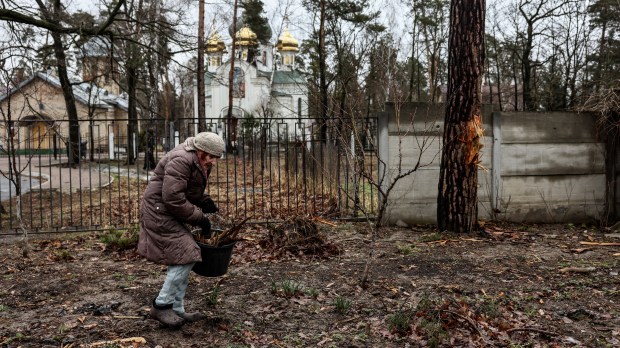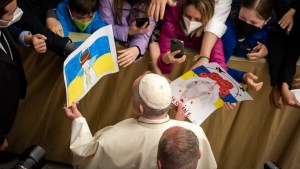The head of one of Ukraine’s major relief agencies has a vision for what will be needed when the war in her country ends. But for now, one of the more pressing tasks is to prepare for what promises to be a harsh winter for many people.
“Everybody is very concerned now” about the quickly approaching cold season, said Tetiana Stawnychy, president of Caritas Ukraine. Stawnychy said in an interview that while she and her staff are continuing to respond to the ongoing needs of millions of people displaced from their homes, they are undertaking preparations for a wartime winter.
Ukraine’s normally cold winters are more of a concern this year because so much of the country’s infrastructure has been damaged or destroyed, posing challenges to the supply and delivery of energy. There have been widespread reports of people stocking up firewood (photo above) or acquiring wood-burning stoves.
The UN Humanitarian Coordinator in Ukraine, Denise Brown, said in late August that she did not believe that vulnerable communities in the east and south of Ukraine had what they needed to survive the coming winter.
Six months since Russia began what it calls a “special military operation” to “denazify” Ukraine, nearly 18 million people, around 40% of the country’s entire population, need humanitarian aid,the UN said.
Many elderly people are living in damaged houses, and the lack of access to gas or electricity in large parts of the east “could be a matter of life or death” if people could not heat their homes, Brown said in a statement.
Regarding the UN Office for the Coordination of Humanitarian Affairs’ plans for winter, Brown explained, “we will have to work differently … we can only assume” that people caught in a war “do not have what is necessary to make it through” the season, “which starts early and lasts long.”
“Russia has targeted critical energy infrastructure since February, including oil refineries and power stations,” according to the Guardian. “In the event that it targets gas infrastructure or gas production facilities, Ukraine is preparing emergency kits that could service up to 200,000 people, including mobile boilers, mobile heating units and diesel power generators.”
Localized support
Caritas Ukraine, part of the Catholic Church’s international humanitarian and development organization, has 37 centers around the country and a network of 448 Ukrainian Greek Catholic parishes through which Caritas is able to provide localized response and further support. Some 1,300 people are carrying out the work, including many who were formerly recipients of Caritas’ help and, after becoming stabilized, have returned to Caritas to join the mission as volunteers or staffers. In addition to providing food, medicine, hygiene, access to drinking water, and psychological and other support, Caritas centers are working to make sure people have adequate shelter and access to heating for the wintertime.
“In areas where homes have been damaged by the fighting, and which are no longer in the line of active conflict, we’re already working on early recovery steps — light repairs,” Stawnychy told Aleteia around the six-month mark after the beginning of the major Russian invasion. “Our main goal in the next few months is to focus our attention on those homes that can be repaired quickly — to get as many people back into their homes as possible before the winter. This would be repairing broken windows or doors, simple repairs that can be finished by the start of winter.”
She said that people are still evacuating out of Russian-occupied parts of Ukraine and areas where there is heavy fighting. She added that the Ukrainian government is asking people to also evacuate from areas where infrastructure has been so damaged by the fighting that the government cannot guarantee heat, water and electricity in the winter months.
“People believe that the war is going to end, for sure,” she said. “They have hope and they have faith that it’s going to end. All wars come to an end. In the meantime you keep praying, you keep working. Over the summer one of our colleagues from abroad asked me how we keep going, and I used the phrase ‘hope in action.’ So you keep going because you have hope, and you act in that hope. You act in hope and faith.”
After the war ends, however, Caritas’ work will be far from over.
“There are whole swaths of the country that have just been completely destroyed,” Stawnychy said. So there will be great need for the restoration of basic infrastructure needs. Caritas would have “clear involvement in helping in recovery,” she predicted. “Our organizations are community based, so while we probably wouldn’t be focusing on huge infrastructure projects, we would certainly work on medium and smaller projects, those in which we already have in-staff competence, such as helping repair drinking water systems. We worked on such programs earlier, in the East [in the war with Russia-backed separatists in Donbas beginning in 2014]. We are also planning to assist with light and medium home repairs, and also helping people with medium-term housing — like module homes while they rebuild their houses.”
She anticipates that in the wake of the war, Caritas will be a key actor in helping individuals and communities recover and restore their lives. This would include “helping people re-find their agency,” helping people restart businesses, engage in their communities, get integrated into the communities where they’ve settled, “help people work through the traumas of war,” and build social cohesion inside of communities. Caritas is already providing psychological help, especially for children — helping them “to process, develop resilience and coping skills, and work through the trauma they’ve experienced.”
Said Stawnychy, “There will be a lot of work to do, years going forward.”



